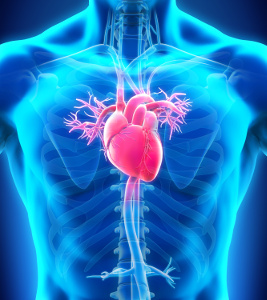Lack of vitamin D increases your risk of atrial fibrillation that is associated with severe complications
 Atrial fibrillation is a rhythm disturbance in the electrical system of the heart. It is also one of the most common heart disorders and can be both harmless and potentially life-threatening. Lack of vitamin D increases the risk of normal atrial fibrillation and postoperative atrial fibrillation, according to a meta-analysis that is published in the scientific journal Nutrition. Vitamin D deficiencies are rather common so it is important to make sure to get enough of the nutrient for preventing and treating this disorder.
Atrial fibrillation is a rhythm disturbance in the electrical system of the heart. It is also one of the most common heart disorders and can be both harmless and potentially life-threatening. Lack of vitamin D increases the risk of normal atrial fibrillation and postoperative atrial fibrillation, according to a meta-analysis that is published in the scientific journal Nutrition. Vitamin D deficiencies are rather common so it is important to make sure to get enough of the nutrient for preventing and treating this disorder.
In a normal heart, the sinoatrial node that is located in the right atrium of the heart ensures even and regular contractions of the heart muscle. When a person suddenly experiences atrial fibrillation, the normal impulses from the sinoatrial node are disabled. This causes rapid and irregular beating of the atrial chambers of the heart. The heart rate becomes irregular and the heart beats too fast. The duration of each attack can vary anywhere from a few seconds to several days. Many people do not experience any or very few symptoms which, beside the irregular heart rate and heart palpitations, include chest tightness, fatigue, and decreased exercise tolerance. The rhythm disturbances in the atrial chambers also increase the risk of blood clots and stroke.
People with atherosclerosis, heart muscle disease (cardiomyopathy), heart valve disease, hypertension, diabetes, or hyperthyroidism have an increased risk of atrial fibrillation. Around 25-40 percent of patients that undergo heart surgery experience postoperative atrial fibrillation (POAF).
As part of the conventional medical treatment, physicians use medical drugs anti-arrhythmic drugs and anticoagulants, but it would also be a good idea to see if the patient lacks vitamin D.
|
The relation between vitamin D and the risk of atrial fibrillation
Vitamin D is primarily known for its role in bone health, but all cells in the human body have vitamin D receptors that control around 10 percent of our genes and a number of physiological processes. Research over the past decades has focused increasingly on vitamin D’s importance for cardiovascular disease, including atrial fibrillation, but studies have shown conflicting results. A group of Chinese scientists therefore decided to conduct a large meta-analysis of 13 studies based on sufficient information. The studies included 74,885 participants, 6,519 of whom suffered from atrial fibrillation. According to the researchers, this it the first meta-analysis to reveal the difference between levels of vitamin D in the blood and atrial fibrillation.
They found that lack of vitamin D significantly increases the risk of atrial fibrillation. Regular vitamin D deficiency (below 20 ng/ml) increased the risk by 23 percent, while insufficient vitamin D status (20-30 ng/ml) was associated with a 14 percent increased risk. They also found that vitamin D supplementation reduced the risk of atrial fibrillation, especially among elderly people.
Furthermore, they observed that supplementation with vitamin D lowered the risk of atrial fibrillation among heart patients that had undergone by-pass surgery.
|
Vitamin D’s role in the cardiovascular system and the heart
The scientists behind the new meta-analysis address the fact that vitamin D has numerous physiological functions that may explain its effect on the heart and cardiovascular system. They say that the chronic inflammation, which is very common, increases the risk of atherosclerosis, cardiovascular disease, and atrial fibrillation. Also, vitamin D supplements can lower levels of CRP (C-reactive protein) that is an inflammation marker.
The vitamin can also inhibit RASS (the renin-angiotensin-aldosterone system) that affects both blood pressure and fluid balance. It should also be added that vitamin D contributes to the regulation of the body’s calcium balance in tandem with magnesium. The major part of our calcium must end up in bones and teeth. If cells in soft tissues like blood vessels and the heart are flooded with calcium ions, the cells may become stressed, go into a cramp and develop inflammatory conditions. That is why we must make sure to get enough magnesium, as well.
Official recommendations and the actual need for vitamin D
The reference intake (RI) levels of white adults younger than 70 years of age is five micrograms/day. The Danish health authorities recommend vitamin D supplementation (10 micrograms) for pregnant women, small children, people with dark skin and individuals that do not get enough sunlight. Supplementation with 20 micrograms of vitamin D are recommended for nursing home residents and people from 70 years and older.
Newer studies show that overweight individuals and diabetics also have an increased need for vitamin D. The same is the case with people on cholesterol-lowering medication (statins). Many scientists claim the actual need for vitamin D is way above the RI level, and their recommendations vary from 30-100 micrograms per day to obtain optimal blood levels of the nutrient.
References
Xiao Liu et al. The relationship between vitamin D and risk of atrial fibrillation: a dose-response analysis of observational studies. Nutrition Journal 2019
Qi Dai el al. Abstract CT093: Bimodal relationship between magnesium supplementation and vitamin D status and metabolism: Results from randomized trial. Cancer Research July 2018
Anne Marie Uwitonze, Mohammed S Razzaque. Role of magnesium in Vitamin D Activation and Function. The Journal of the American Osteopathic Association. 2018
The North American Menopause Society (NAMS) Vitamin D could lower the risk of developing diabetes. ScienceDaily 2019
Scott LaFee. Vitamin D Deficiency Linked to Greater Risk of Diabetes. UC San Diego Health. April 2018
https://netdoktor.dk/sygdomme/fakta/atrieflimren.htm
https://pri.rn.dk/Sider/7347.aspx
Search for more information...
- Created on .








